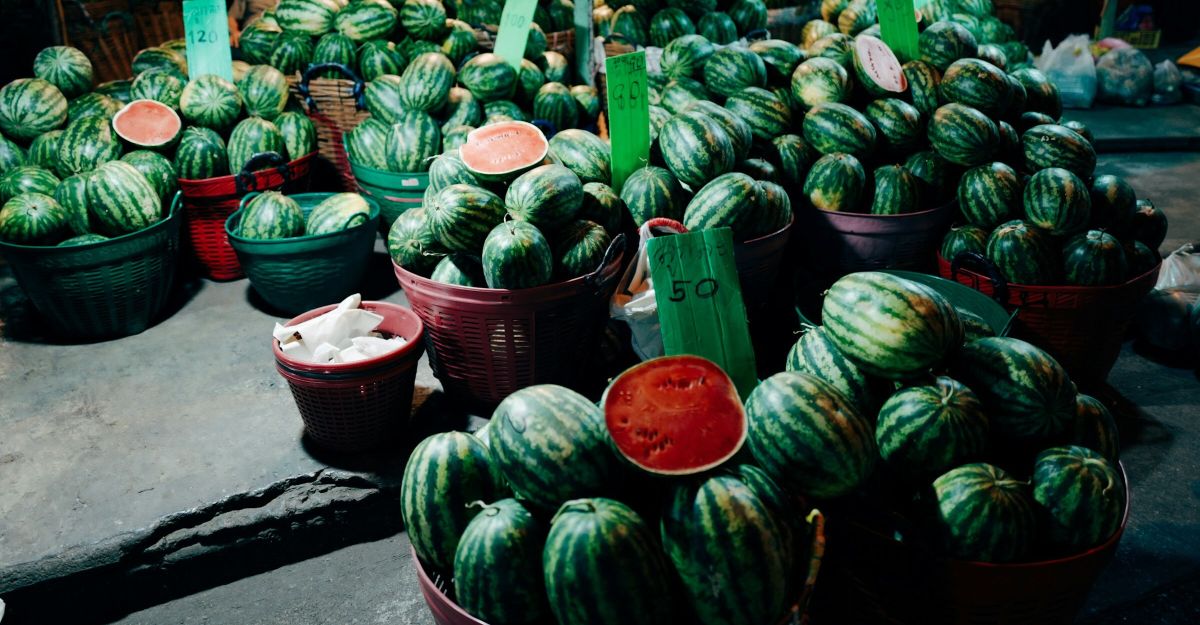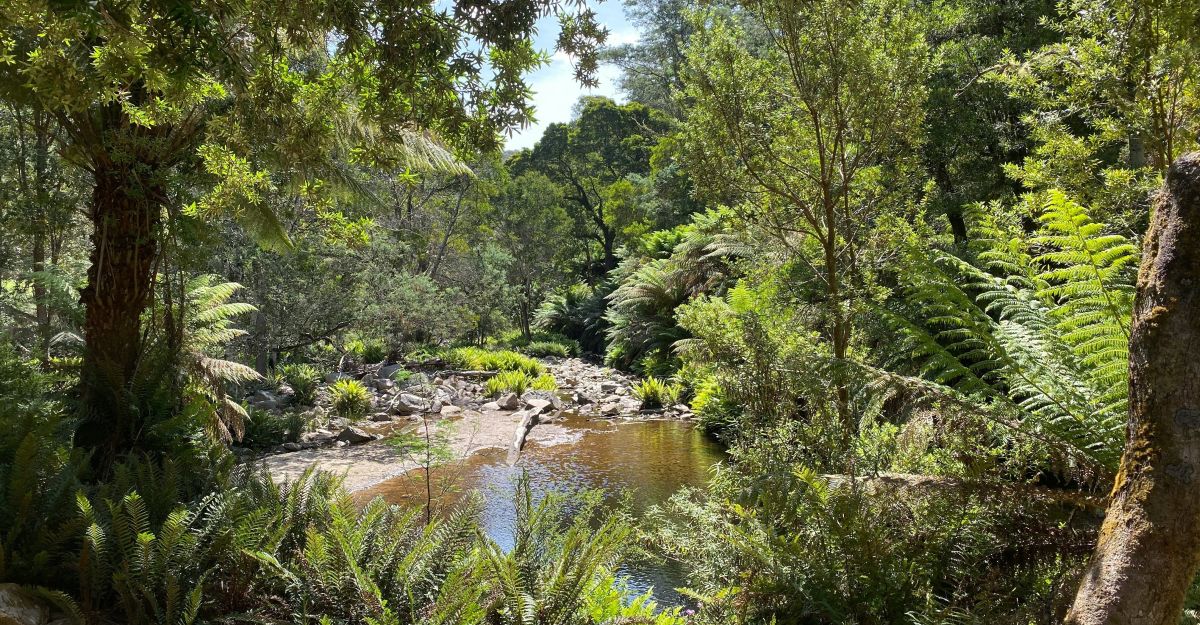It was supposed to be a quick trip to Richmond to pick up some uppers, some downers and something for the cat. I sat gawking at the passengers on the Hurstbridge line, sipping on a servo raspberry slushie, the white paper straw rattling against the rim of the cardboard cup as the train moved onwards.
A woman opposite me was quietly crying on the phone, her hand resting against her temple, when I saw the sign for Preston Market. I leaped to my feet, the slushie running down the aisle in two pink rivulets. Some kids on the four-seater behind me giggled as they raised their legs to avoid the deluge.
I got myself a gozleme, tearing into the greasy butcher’s paper, the molten cheese oozing like worms onto my tongue. It was nice to have something warm since it was a particularly cold autumn, with me and the mice shivering in an unsealed weatherboard house.
And then, in the most unlikely of places, I saw her.
Caught me off guard considering the time of year. I admit I have a preference for tarty fruits. Sour cherries in summer. Quinces in winter. I don’t normally go for melons, but her name was in my mouth from the moment my eyes rested on that perfectly bulbous body. Rosalind. A name with a yearning sweeter than that dreary autumn day.
I tried to focus on a couple bickering about the price of oil outside D’Souza’s, who always tried to upsell me pakoras from the bain-marie, but my gaze kept sliding back to her.
I approached the melon stand, hands in pockets, head stooped sheepishly. She was heavy when I cupped her, as though full of juice. When I pressed my ear against her, I could hear her sloshing. And her scent! Better than a whiff of jasmine flowers on a summer’s night.
I felt a hand on my shoulder. The shop keeper, wearing a wife beater singlet, gold cross around his neck and a fisherman’s cap on his head, sweating even though the rest of us were frozen stiff. When he smiled, I saw his gold tooth, third from the right.
“Nice melon,” he said, though he was looking at a woman with a plait down to her arse, feeling the avocados.
I watched him weigh my melon through the slanted mirrors that sat behind the waxed Royal Galas, the entire metal bowl sagging like it would snap. She cost me a full $13.99, whopper that she was. He started unrolling a white plastic bag, but I refused. I knew she wasn’t that kind of melon.
Out the front of the market, seagulls squawked and fought over loose olives that had rolled beneath the parked cars. I decided to forgo the trip to Richmond. The cat, miserable creature that she was, could starve for all I cared.
“Can’t take a melon on the bus,” said the driver, jabbing his thick finger into Rosalind.
“How come?”
“On a schedule mate,” he said, staring into the rear-view mirror.
I didn’t want to leave Rosalind behind, not because I was afraid of someone taking her, but because I wasn’t sure she’d wait for me.
I stuck her under my shirt to create a bag and we walked St George’s Road all the way from Preston to the bowels of Rezza. By the end of it, I was certain of one thing. I wanted to spend every one of my days on this stinking earth, however many were remaining, with Rosalind by my side.
First time’s always a fumble. But not with Rosalind. Even that very first was electric, as though our edges had been shaped to fit perfectly together. We lay for hours, until at some point I realised it had gotten dark and I could no longer see my own nose. My stomach rumbled. I could hear laughter from downstairs. I put on my largest shirt and stuck her between the folds of fabric.
The house was full of people. The kitchen counter was stacked with cans, most of them open with utensils sticking out, the counter surface sticky with juices. Cream of chicken soup, cannellini beans, tinned spaghetti, pineapple slices – the lot. Jenna was afraid of cooking since her great aunt died alone in a house fire the year earlier.
She was standing with her arms around some guy. Probably had picked him up at a socialist alternative meeting. Not that she supports them necessarily, but she says you’re guaranteed a good root when everyone’s so riled up from the infighting.
Jade and Kate were standing over a spilt tin of chilli con carne, big tomatoey mess on the wooden table. Kate’s brow was so furrowed that her forehead looked like rock formations.
I had reached that age when suddenly everyone around me had decided to get married and have children with whoever they happened to be with. Jade’s ring was enormous, the size of a pinto bean. I thought she had put it on the wrong finger, but what would I know anyway.
“This is Rosalind,” I said, lifting my shirt. “We’re in love.”
I had never said those words exactly to Rosalind in the few hours I’d known her but now was a good a time as any.
“So nice that you’re so happy.”
“Enjoy it while it lasts.”
“You should think about marriage.”
“Well, we’ve only just met.”
“Good for you then,” said Kate and with that she drained her glass of wine and poured herself another.
I excused myself and sat outside with Rosalind, watching the people through the slashed-up fly screens, all of them with smiles that didn’t quite reach their eyes talking about things that no one really wanted to listen to.
Being with Rosalind was peaceful. I read to her a lot in the early days. It was hard to say which books she liked the most, so I cycled through the entire paranormal mystery section at the library. We read in the bath, in between forkfuls of spaghetti, at traffic lights until the cars behind me started beeping. I gave up the smokes, the uppers and the downers and found myself a job at the bike shop doing repairs.
I don’t know why it started happening. The first time was at a sushi restaurant in Thornbury. I paid and got on the train, not realising until I reached Regent that I’d left Rosalind behind. By the time I got back, they had switched off the lights and stacked the chairs onto the tables.
“You’re very lucky,” said the shopkeeper, waggling her finger at me. “I was just about to leave.”
And then it happened again. I was at a protest at the State Library and there were lots of other melons. Posters with watermelon slices and shirts with watermelon slices and people with watermelon badges. The melons I saw seemed so alive. Not like Rosalind with her endless silences which I had begun to find grating, her wooden demeanour and unwavering commitment. I had started to resent that I could say whatever I wanted and she never offered any resistance.
The speeches were just wrapping up when I saw her, laid out beneath the sculpture of Joan of Arc on her horse. I hadn’t realised I’d lost her in the crowd. Rosalind looked so small, much smaller than I ever remembered, the size of a grapefruit. Not a melon at all.
Another time at a party, I went home with a woman who had seashells in her ears. I forgot about Rosalind until the seashell woman took her earrings off and put them on her bedside table. I got the bus back to the party. The music was a murmur, but some people were still kicking on in the backyard, gurning their jaws.
She was in a bathtub filled with ice in the shed, a great big crack on her side, red spilling out.
I couldn’t afford an ambulance. So, I bundled Rosalind up and took her to the main road, where I hailed a taxi.
“Where to?” said the driver.
“Austin emergency. And make it quick,” I said, my voice quivering.
The entire drive to emergency, I squeezed her broken sides together. When we arrived, I passed the driver a twenty. He recoiled. The note was slick with her juices.
“Don’t forget the cleaning fee,” he said. “You can’t spew in my car for free.”
The woman at reception had yellow teeth.
“What’s the problem?”
“My girlfriend’s been hurt, it’s serious,” I said.
“Where is she?”
“I don’t have time to play games! This is an emergency!” I held up Rosalind. Juice dripped down my arm. I was tempted to lick it off.
The woman’s eyes flicked down the length of Rosalind’s battered body and then down the length of my own.
“We don’t treat fruit here.”
I let out a groan. “I’ll call the police!”
She put her arms up in front of her as though to say, be my guest. She was right. Since when had the police ever been any help.
At home, I lay Rosalind in my unwashed sheets, sobbing into her side, the salt of my tears burning through her pith. She was silent as usual. I wished more than anything that she’d tell me what she really felt.
“What’s the point of being together when we don’t even talk!” I yelled.
“Quit crying, I’m trying to sleep!” said Jenna through the wall.
I sat by her for days, watching the sun rise and fall, sponging her bulbous body with warm salt water. But after a while, I grew weary of keeping vigil. There was a whole world out there. I couldn’t stop thinking about the woman with the seashell earrings. On my desk sat a pile of overdue library books. I had stopped returning the books when I stopped reading to Rosalind. I wrapped Rosalind in some old t-shirts and put her on the windowsill. She probably just needed some time to heal on her own.
When I returned a few days later, my cheeks flushed and my hair wild, the window was wide open.
Rosalind was gone.
I left abruptly and with barely any trace, except a note for Jenna which said thanks for nothing and the stale panettone that I took from above the fridge.
A year later, I returned to pick up a TV. I was single by then. It hadn’t taken long for my ocean lover to turn me inside out with her tempestuous fits.
The house looked cared for. The bins weren’t overflowing with cans and the lawn had been mown. Right outside my bedroom window grew a watermelon vine. The new tenant was tending to it, her belly swollen and sticking out above her trackies. She cut a watermelon off and sliced into it, not offering me a piece.
“Are you really going to eat that?” I said.
She shrugged and opened her mouth, stuffing the entire piece into her gob, pith and all.



